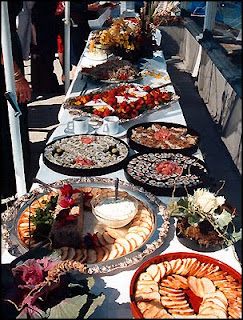 A sermon preached at Evensong Sunday 29th August 2010.
A sermon preached at Evensong Sunday 29th August 2010.As we await the outcome of our recent election
there is opportunity for us to reflect
on how a Christian should vote.
There is no doubt that Christians are political.
One only has to cursorily read the Old Testament
to discover that God is the God of a nation
and that the affairs of the nation
are God's affairs.
He cares for them in difficulty and travail,
he admonishes them when they fail in their work.
As when, for example, the rich and powerful exploit
A tale familiar to us even today, of compulsory land acquisition by Government!
Of course, as we often say, history is written by the victors.
It may be true to say also that the Old Testament
was written by the victors, God's victors!
I urge that supplications, prayers, intercessions, and thanksgivings should be made for everyone, for kings and all who are in high positions, so that we may lead a quiet and peaceable life in all godliness and dignity.
1 Tim 2:1-2
This is for the good of all society.
I make the observation that even though our Prime Minister
may declare herself to be an atheist
this does not absolve us of the responsibility
of holding our leader befo0re God.
Just because she does not believe does not mean
that we should stop believing!
So, lest we think that Christians are to look upon the body politick
with disdain
or to live in a realm other than this world;
we are reminded that this is not the case.
Indeed, at this service of Evensong
we heed as the centrepiece
the canticle Magnificat
which reminds us that
God, regards lowliness rather than power and influence
as the key characteristics of Godly life,
that God moves to strike the arrogant and those who think that they, not God,
rule all things
It is for the hungry that he cares
and he turns the rich away empty
as he exalts the lowly.
This is truly a radical policy!
Indeed, some commentators observe that this statement
is Jesus's political manifesto.
One that deeply threatened the established order.
When we wonder ...who God voted for?
It is likely that we should look not for those
who promised to make us rich and successful
but rather for the ones who sought to care for the poor and lowly
(we might differ about which side ....if any...was promising that)
A real question for us who call ourselves
Christian
is whether we critiques the bribes and policies
that were thrown at us
by such criteria as...will this advance the cause of the poor, will this care for the weak
It is more likely that you and I said...what's in it for me?
And we wonder why we are in a bit of a mess.!!
May God help our country
to be truly Godly.
caring for the poor and lowly
Rejecting the greed of rich, and the ambition o0f the powerful.
May God bless Australia, and make us truly Godly. Amen
 The potter at his wheel is a very evocative image, more so to those who would have witnessed it (like Jesus) in their own backyards.
The potter at his wheel is a very evocative image, more so to those who would have witnessed it (like Jesus) in their own backyards. 



